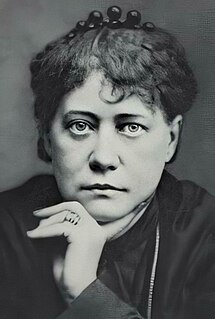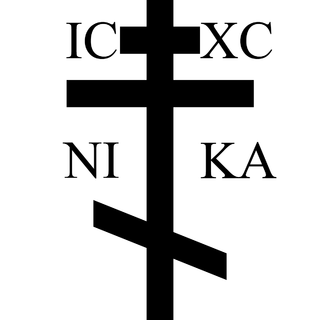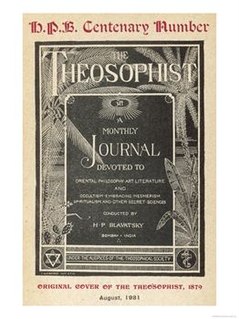 W
WHelena Petrovna Blavatsky was a controversial Russian occultist, philosopher, and author who co-founded the Theosophical Society in 1875. She gained an international following as the leading theoretician of Theosophy, the esoteric movement that the society promoted.
 W
WChristianity and Theosophy, for more than a hundred years, have had a "complex and sometimes troubled" relationship. The Christian faith was the native religion of the great majority of Western Theosophists, but many came to Theosophy through a process of opposition to Christianity. According to professor Robert S. Ellwood, "the whole matter has been a divisive issue within Theosophy."
 W
WThe Coulomb Affair was a conflict between Emma and Alexis Coulomb, on one side, and Helena Blavatsky and the Theosophical Society, on the other.
 W
W"The Esoteric Character of the Gospels" is an article published in three parts: in November-December 1887, and in February 1888, in the theosophical magazine Lucifer; it was written by Helena Blavatsky. It was included in the 8th volume of the author's Collected Writings. In 1888, for this work, the author was awarded Subba Row medal.
 W
WYelena Andreyevna Hahn was a Russian writer known for her contributions to the literary journals Biblioteka Dlya Chteniya and Otechestvennye Zapiski. In addition to her literary works, she is known as the mother of Helena Blavatsky, founder of Theosophy.
 W
WHinduism is regarded by modern Theosophy as one of the main sources of "esoteric wisdom" of the East. The Theosophical Society was created in a hope that Asian philosophical-religious ideas "could be integrated into a grand religious synthesis." Prof. Antoine Faivre wrote that "by its content and its inspiration" the Theosophical Society is greatly dependent on Eastern traditions, "especially Hindu; in this, it well reflects the cultural climate in which it was born." A Russian Indologist Alexander Senkevich noted that the concept of Helena Blavatsky's Theosophy was based on Hinduism. According to Encyclopedia of Hinduism, "Theosophy is basically a Western esoteric teaching, but it resonated with Hinduism at a variety of points."
 W
WReport of the committee appointed to investigate phenomena connected with the Theosophical Society, commonly called the Hodgson Report was an 1885 report by the Society for Psychical Research (SPR) on Helena Blavatsky and purportedly apported Mahatma Letters.
 W
WIncidents in the Life of Madame Blavatsky: compiled from information supplied by her relatives and friends is a book originally published in 1886 in London; it was compiled by a member of the Theosophical Society A. P. Sinnett, the first biographer of H. P. Blavatsky. He describes the many unusual incidents in her life, beginning from her childhood in Russia and asserts that she has been with "an early connection with the supernatural world;" he says about her short unlucky marriage and "decade of extensive global travels," about her period of learning in Tibet, and the "criticism she received about some of her 'phenomena' and practices."
 W
WLucifer was a journal published by Helena Blavatsky. The first edition was issued in September 1887 in London. The journal published articles on philosophical, theosophical, scientific and religious topics. It also contained book reviews, for example of Friedrich Nietzsche's Thus Spoke Zarathustra.
 W
WThe Occult World is a book originally published in 1881 in London; it was compiled by a member of the Theosophical Society A. P. Sinnett. It was the first theosophical work by the author; according to Goodrick-Clarke, this book "gave sensational publicity to Blavatsky's phenomena" and the letters from the mahatmas, and drew the attention of the London Society for Psychical Research.
 W
WThe Theosophist is the monthly journal of the international Theosophical Society based in Adyar, India. It was founded in India in 1879 by Helena Blavatsky, who was also its editor. The journal is still being published till date. For the year 1930, the journal was published in Hollywood, California by Annie Besant and Marie Russak Hotchener, but it returned to Adyar in 1931. The journal features articles about philosophy, art, literature and occultism.
 W
WTheosophy is a religion established in the United States during the late nineteenth century. It was founded primarily by the Russian immigrant Helena Blavatsky and draws its beliefs predominantly from Blavatsky's writings. Categorized by scholars of religion as both a new religious movement and as part of the occultist stream of Western esotericism, it draws upon both older European philosophies such as Neoplatonism and Asian religions such as Hinduism and Buddhism.
 W
WModern Theosophy is classified by prominent representatives of Western philosophy as a "pantheistic philosophical-religious system." Russian philosopher Vladimir Trefilov claimed that Blavatsky's doctrine was formed from the beginning as a synthesis of philosophical views and religious forms of the various ages and peoples with modern scientific ideas. Michael Wakoff, an author of The Routledge Encyclopedia of Philosophy, stated that Blavatskian Theosophy was based on Buddhist and Hindu philosophy, and fragments of the Western esotericism with using an "absolutist metaphysics." In The New Encyclopedia of Philosophy it is said that Blavatsky's Theosophy is an attempt to merge into a universal doctrine all religions by revealing their "common deep essence" and detection of "identity meanings of symbols," all philosophies, and all sciences.